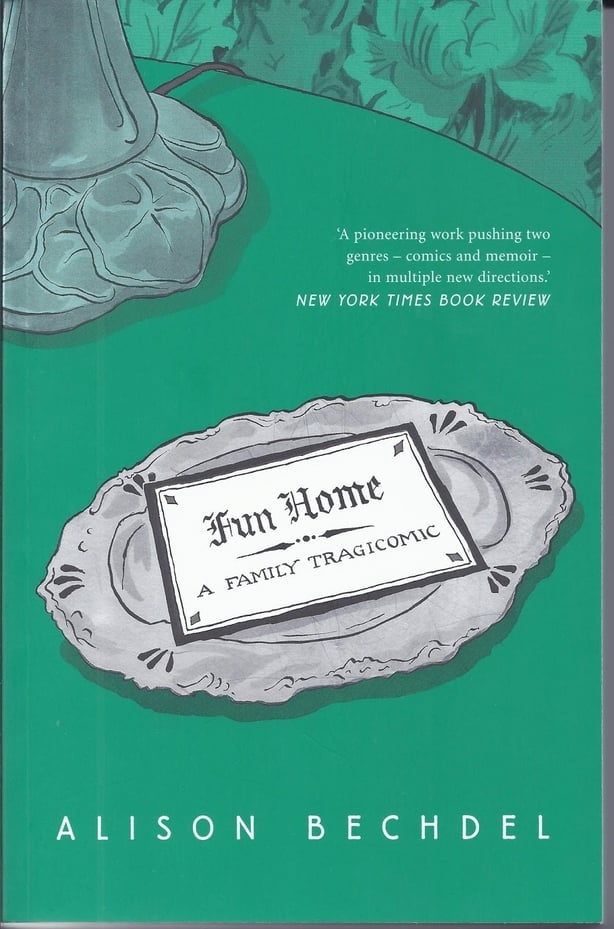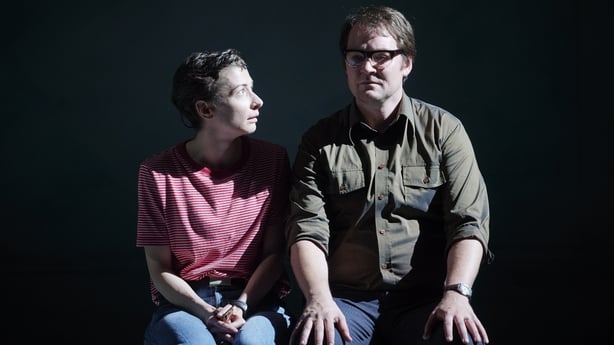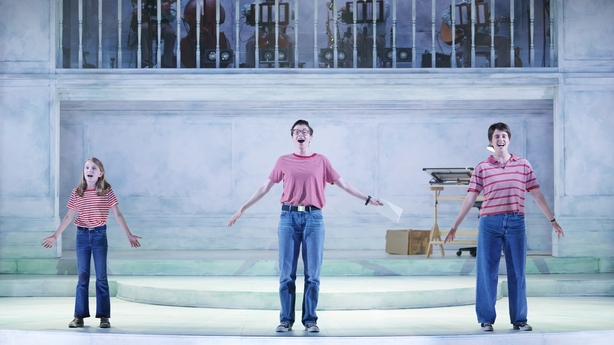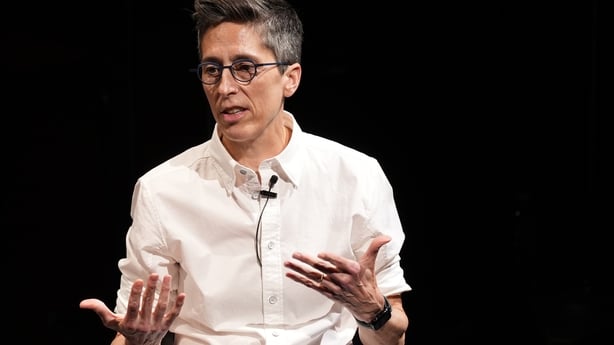Activist and writer Una Mullally introduces Fun Home, the Tony Award-winning musical adaptation of Alison Bechdel's acclaimed graphic novel, now playing at Dublin's Gate Theatre.
The first time I picked up Alison Bechdel's graphic-memoir Fun Home, I didn’t put it down until the final page was turned. It is a radical, form-bending work. Its layers are sedimentary. Afterwards, I wondered how someone could make something so meticulous yet so deeply emotional. How could the subtext, the literary references, the callbacks, the weaving of memory, hidden family histories, and emotional interiors, all be contained in the guts of 230 pages? There are two reactions other writers have to a piece of art this seismic and deft: deflation ("I’ll never be able to do something like that!") and revelatory inspiration ("I’m so thankful this work is in the world!")

Imagine then, the collective surprise of fans of Fun Home the book, when we learned that it was to become a musical. A musical? Could such a work be transformed yet again? But the thing about great art is that it keeps becoming not just itself, but new versions of other things, spinning out from its source to inhabit different forms. Great art is never complete. There’s always something to draw out and from. It goes into us, out of us, and keeps transforming.
Watch: About Fun Home the musical, as told by the cast
In New York City, where Bechdel was living when she began sketching what would become the first instalment of her long-running comic strip Dykes To Watch Out For, Fun Home exploded on Broadway. On stage, it became yet another landmark queer work, and a key moment in lesbian representation on stage. And yet the story is a familiar one in queer culture: tragedy, pain, and the struggle to find oneself. With Fun Home the musical, Bechdel’s art was given yet another layer, an adaptation with songs that mined the text and found new gold; Ring of Keys, Telephone Wire, Maps, and Days and Days.
We need your consent to load this Spotify contentWe use Spotify to manage extra content that can set cookies on your device and collect data about your activity. Please review their details and accept them to load the content.Manage Preferences
Listen to the Fun Home soundtrack, via Spotify
Despite Fun Home’s impact - both the graphic-memoir, and the musical - it remains, in a strange way, niche. While queer stories continuously enter the mainstream with increasing diversity and frequency, lesbian stories, even writ large, have a way of maintaining a subcultural stance. Sure, Fun Home won multiple Tony Awards, including the prize for Best Musical, and sure, Bechdel’s name is now synonymous with a feminist analysis of cinema thanks to a small but perfectly formed joke made in a Dykes To Watch Out For strip in the 1980s, and sure, the graphic-memoir is rightly viewed as seminal. But isn’t it funny that such a devastatingly tender, funny, and important piece had yet to reach a broader audience in Ireland, a place where it often feels as though everything flows from the foundational - if cracked and fraught - building block of the family? That is of course, until now.
We need your consent to load this rte-player contentWe use rte-player to manage extra content that can set cookies on your device and collect data about your activity. Please review their details and accept them to load the content.Manage Preferences
Listen: The stars of Fun Home talk to (and sing for) RTÉ lyric fm
The specificity of Fun Home’s story isn’t just part of its charm, it’s the lever that manages to expand its emotional integrity out into the universal. And the other thing about great art is, it grows with you. Returning to Fun Home now, my reaction to it is different, deeper, ever-evolving. I notice new things, missed aspects of plot, detail. I’ve changed, and so the engagement does too.

In the graphic-memoir, when the author details her father’s dexterity regarding an almost two-decade restoration of their family home, Bechdel writes, "He would manipulate flagstones that weighed half a ton… and the thinnest, quivering layers of gold leaf." This juxtaposition - strength and delicateness, heft and fragility, brute force and beauty - encompasses so many contradictions within family. There is certainty, and there is doubt. There is solidity, and there is fluidity. There is honesty, and there are lies.

In my childhood, whenever someone was obfuscating, being coy, or attempting a circuitous route towards the truth in conversation, my own grandmother used to huff and snap, "say it out." Saying it, bringing the truth forth, and indeed outing oneself, is a radical act. Nowhere are these gestures more acute than within the family, where versions of events bend with time, perspective, and memory, and where so much can be going on that remains hidden, unseen, or ignored. Despite our proximity within a household, our experiences together while we come of age amongst parents and siblings under one roof, can be vastly different. How curious that closeness can lead to distance, that familiarity can often cause separation, and that a common timeline can have entirely different landmarks.

Speaking to Bechdel in the run up to the production at the Gate, she recalled the intensity of seeing the musical adaptation of her upbringing on stage, "Obviously, it’s a very peculiar, particular story, about a queer daughter of a closeted man who ran a funeral home," she said, "but what people are responding to are not the particulars of that story, but the idea of telling the truth about a family, about something that for whatever reason people feel that they can’t talk about. Most families - I used to think it was every family, but I’ve since learned there are some functional families in the world - think that by not talking about stuff, somehow that’s going to help, or that’s somehow a good idea. That is absolutely never a good idea. I think everyone feels this sense of liberation at witnessing a family where the secret is said out loud."
Fun Home is at the Gate Theatre until August 26th - find out more here.
Pics: Ros Kavanagh

